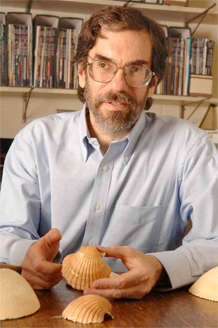NSF Award from the Division of Earth Sciences
Collaborative Research: The dynamics of geographic ranges: Origin and maintenance of marine diversity gradients
- Principal Investigator: David Jablonski, PhD, William Kenan Jr. Professor in Geophysical Sciences
- Start Date: August 15, 2009
- Total Award Amount: $270,000
Project Description
This award is funded under the American Recovery and Reinvestment Act of 2009 (Public Law 111-5). The most striking large-scale pattern in biological diversity is the dramatic increase in the number of species and higher taxa from the poles to the tropics. However, the dynamics that generate and maintain that trend remain poorly understood, despite their importance not only for evolutionary and ecological theory, but for the management and conservation of biological resources. In developing marine bivalves as a model system for tracking evolutionary and geographic histories of biodiversity (because bivalves are diverse and well-sampled in most marine environments and have a rich and well-documented fossil record), we have found that the spatial expansion of evolutionary lineages across latitude is a crucial factor shaping the global diversity gradient. Our proposed study will use the marine bivalves to evaluate how these dynamics operate, by tracing present-day bivalve biodiversity back through the past 25 million years. We will focus on three major questions:
- What is the process of range expansion?
- Is range expansion selective?
- What inhibits range expansion?
This work exemplifies the key data and analyses that the fossil record can contribute to understanding biodiversity dynamics at global and regional scales. We can use the geologic record to assess both the major biological factors governing those dynamics, and the interaction of intrinsic, biological factors with extrinsic, time-varying climatic factors in shaping diversity in time and space.
By documenting the long-term responses of marine bivalves to climatic events of the recent geologic past, our study will also provide a better foundation for predicting the response of the living biota to future climate change. In addition, by incorporating biotic factors such as body size and geographic range size in a dynamical framework, this work will furnish a bridge between paleontological data and studies of present-day biodiversity.
This research will support the education of a graduate student and a postdoctoral researcher, who will be treated as full collaborators in this work, including training in research planning, presentation of results, publication, and career guidance. We will continue to develop on-line educational resources derived from our research (pages on our work at the Understanding Evolution website have received more than 58,000 visits).
This award is funded under the American Recovery and Reinvestment Act of 2009, NSF Award number: 0922156

David Jablonski, PhD,
William Kenan Jr. Professor in Geophysical Sciences
